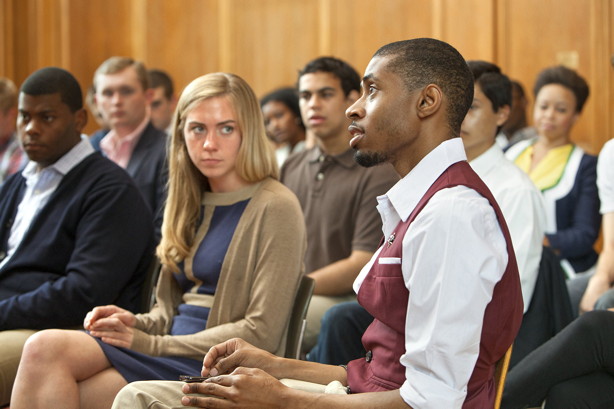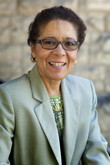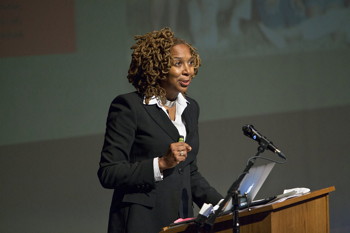CAMPUS LIFE

Cornell Student Assembly President Ulysses Smith '14, right, at a recent 626 Thurston event.
At 626 Thurston, talk is not cheap
"We want to help our students develop a universal fluency of cross-cultural communication and understanding," says Renee Alexander '74, associate dean of students and director of intercultural programs at the Cornell Center for Intercultural Dialogue, known on campus by its nickname "6-2-6," derived from its Thurston Avenue address.

Renee Alexander '74. Photo: provided. See larger image
Alexander adds that she's pushing for students to have this fluency "before they get a passport, before they get on any plane," placing her work in the context of Cornell's recent push to increase internationalization of its curriculum and the student experience.
Since fall 2011, 626 Thurston has served as Cornell's hub for conversations about differences – in race, ethnicity, culture, class, gender and sexuality. Last fall, the center completed something of a rebranding effort that publicized the center's new tagline: "Students Uniting Cornell."
"It's more than a tagline, more than a glossy campaign," Alexander says. If you spend an hour or so at 626, you may be inclined to agree.
On a Thursday this fall, students filled seats in the downstairs reception room to listen to the invited speaker, Kimberlé Crenshaw '81, a distinguished law professor at UCLA and Columbia School of Law who is considered to be one of the foremost experts on race and the law. Instead of a lecture, real dialogue ensued, with Crenshaw quizzing her audience about the climate on campus and the state of intercultural dialogue.
The students represented many groups: there was a white Republican, a Hispanic Class of 2012 alumnus, several members of the Women of Color Coalition, a white biology undergraduate active in the intercultural center, several members of the Student Assembly and an Asian graduate student who studies race in human resource policies.

Kimberl Crenshaw '81. See larger image
In addition to informal discussions with visiting guests, the center offers gathering spaces, workspace and computers, offices, and two main program tracks to increase the quantity and quality of intercultural dialogue on campus.
The first is an intergroup dialogue project, a for-credit, multidisciplinary class based on a model developed at the University of Michigan. Students are trained as class facilitators. Last semester's topic was socioeconomic status; this semester, there are two classes, on race and on gender. Natasha Herrick '15 was a student in the class two semesters ago and a facilitator last semester. "When the students did their final projects," Herrick remembers, "I saw how much they had learned and how far we'd come as a group. It was really touching to me. It was a moment of hope." Herrick also says that her involvement changed the course of her college career and "made me approach all of my classes differently."
The second program is a series of dinners about difference and reconciliation. "You get two student organizations, for instance Cornell Hillel and MECA (the Muslim Educational and Cultural Association), who actually get along quite well," Alexander explains. "Or The Cornell Daily Sun staff and the Cornell Review staff, who don't. … The impact is respect, the ability to listen to people." Four dinners are planned for the spring semester.
"This has been a most productive semester, coming to events like [Crenshaw's]," says Alfonse Muglia '14, director of elections for the Student Assembly and a College Republican. "I think it's the first step, getting people in the room together. There's definitely room to make the conversations more about understanding each other."
For Simon Boehme '14, a Truman scholar studying in the ILR School, "626 is the epicenter of Cornell's discourse on understanding cultural, racial and socioeconomic issues that are so important to conflict resolution and education, two areas I'm devoted to studying," he says. "Some of my best conversations around improving education for every child happened at 626."